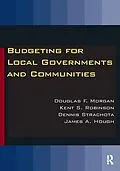Budgeting for Local Governments and Communities is designed as the primary textbook for a quarter or semester-long course in public budgeting and finance in an MPA programme.
Many currently available texts for this course suffer from a combination of defects that include a focus on federal and state budgeting, a lack of a theoretical governance framework, an omission of important topics, and typically a lack of exercises and datasets for student use. Budgeting for Local Governments and Communities solves all of these problems.
The book is exceptionally comprehensive and well written, and represents the efforts of veteran authors with both teaching and real-world experience.
- Key Features:
- Special Focus on Local Government Budgeting: focuses exclusively on budgeting at the local levels of American government, which are responsible for spending 40 percent of the taxes collected from citizens.
- Integration of Theory and Practice: teaching cases and chapters capture the "lessons learned" by professional practitioners who have extensive experience in making local public budgeting work on the ground.< /li>
- Polity Approach to Local Budgeting: presents an introduction to local budgeting as the central political activity that integrates the resources of the community into a unified whole. Budgeting is presented as governance work, rather than as a unique set of skills possessed by analysts and financial specialists.
- Legal, Historical, Economic and Moral Foundations of Local Government Budgeting: provides readers with an understanding of how the structures and processes of local budgeting systems are firmly tethered to the underlying core values, legal principles and historical development of the larger American federal, state and local political systems.
- Electronic Datasets and Budgeting Exercises: the text includes access to extensive electronic datasets and practice exercises that provide abundant opportunities for students to "learn through doing."
- Extensive Glossary and Bibliography: covers terms on the history and practice of local public budgeting.
Autorentext
Douglas F. Morgan, Kent S. Robinson, Dennis Strachota, James A. Hough
Zusammenfassung
Budgeting for Local Governments and Communities is designed as the primary textbook for a quarter or semester-long course in public budgeting and finance in an MPA programme.Many currently available texts for this course suffer from a combination of defects that include a focus on federal and state budgeting, a lack of a theoretical governance framework, an omission of important topics, and typically a lack of exercises and datasets for student use. Budgeting for Local Governments and Communities solves all of these problems.The book is exceptionally comprehensive and well written, and represents the efforts of veteran authors with both teaching and real-world experience.Key Features:Special Focus on Local Government Budgeting: focuses exclusively on budgeting at the local levels of American government, which are responsible for spending 40 percent of the taxes collected from citizens.Integration of Theory and Practice: teaching cases and chapters capture the "lessons learned" by professional practitioners who have extensive experience in making local public budgeting work on the ground.Polity Approach to Local Budgeting: presents an introduction to local budgeting as the central political activity that integrates the resources of the community into a unified whole. Budgeting is presented as governance work, rather than as a unique set of skills possessed by analysts and financial specialists.Legal, Historical, Economic and Moral Foundations of Local Government Budgeting: provides readers with an understanding of how the structures and processes of local budgeting systems are firmly tethered to the underlying core values, legal principles and historical development of the larger American federal, state and local political systems.Electronic Datasets and Budgeting Exercises: the text includes access to extensive electronic datasets and practice exercises that provide abundant opportunities for students to "learn through doing."Extensive Glossary and Bibliography: covers terms on the history and practice of local public budgeting.
Inhalt
Preface and Acknowledgments PART I. GENERAL CONCEPTS OF LOCAL PUBLIC BUDGETING Teaching Case: A Case of Drastically Falling Nonprofit Revenues 1. Local Public Budgeting and the Challenges of Decentralized Governance 2. Local Public Budgeting and Democratic Theory 3. The Multiple Purposes of Public Budgeting 4. Budget Actors: Conflicting Perspectives 5. The Budget Cycle: Characteristics and Consequences PART II. REVENUES AND BUDGETING Teaching Case: Commissioners Request Recommendations on a Public Safety Services Levy 6. Obtaining Governmental Revenues 7. Forecasting Governmental Revenues: Techniques and Limitations 8. Polity Revenues and Governance Decisions 9. Budget Funds Organize the Public Budget 10. Budget Planning: Preparing the Organization and Community to Budget PART III. EXPENDITURE FORMATS FOR DECISION AND CONTROL Teaching Case: A New Mayor Mandates Performance-Based Budgeting 11. Line-Item (Object Code) Budgeting 12. Planning, Programming, Budgeting System (PPBS) Format 13. Performance Budgeting 14. Public-Sector Innovation and Zero-Base Budgeting PART IV. EXECUTIVE PRIORITIES, BUDGET ADOPTION, AND IMPLEMENTATION Teaching Case: Negotiations with City Unions Threaten to Disrupt the Budget Process Teaching Case: County Board Consideration of a Capital Project That Could Jeopardize the County Credit Rating 15. Executive Budget Preparation and Legislative Body Approval 16. Capital Budgeting and Financing 17. Budget Execution 18. Audit and Performance Evaluation 19. Local Budgeting for the Common Good Glossary Bibliography Index About the Authors
